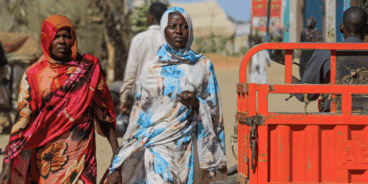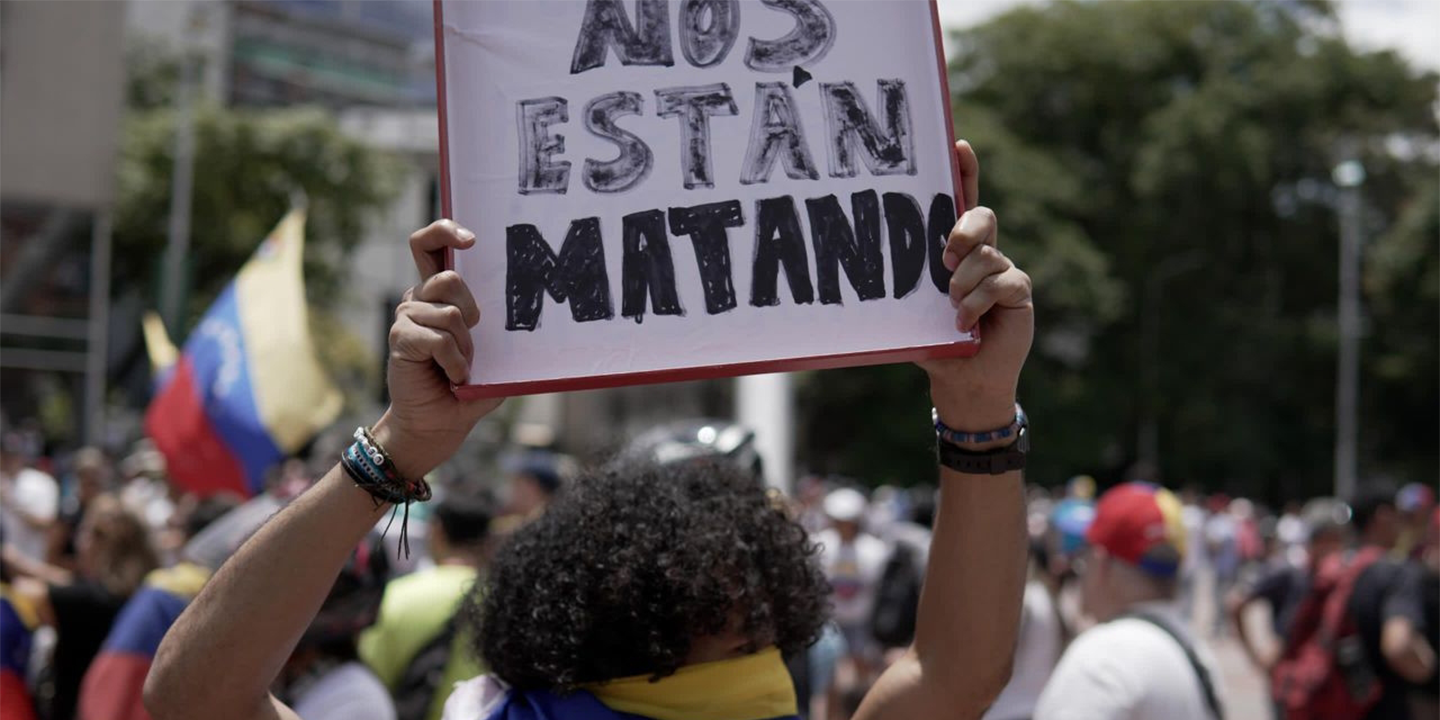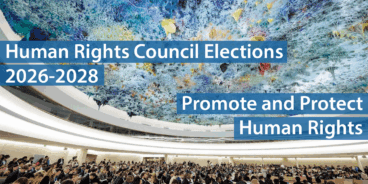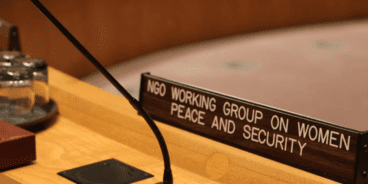

Venezuela: UN Rights Council should renew experts’ mandate/Venezuela: La ONU debe renovar el mandato de expertos independientes
International Accountability Urgently Needed Amid Intensifying Post-Election Repression
The United Nations Human Rights Council should renew the mandate of its Independent International Fact-Finding Mission on Venezuela, 30 national and international organizations defending human rights in Venezuela said today.
The Mission can play a key role in pushing for accountability and maintaining international scrutiny amid widespread repression following the July 28, 2024, election, the groups said.
The Mission’s team of three experts are scheduled to present their fifth report on September 19 during the 57th session of the Human Rights Council, which will take place between September 9 and October 11. A resolution is needed to extend the mission’s mandate beyond October.
A group of Latin American governments, from across the political spectrum, as well as Canada, have in the past presented a text establishing the Mission’s mandate for adoption. If a vote is called by the Council’s member states, a simple majority is needed to adopt the text.
In the aftermath of the presidential election, Venezuelans are facing a violent crackdown on voters and protesters, political leaders, journalists, human rights defenders and other actual or perceived alleged opponents of the Maduro administration, making the need to renew the expert’s mandate especially urgent, the groups said.
The Human Rights Council established the Mission in 2019 to investigate “extrajudicial killings, enforced disappearances, arbitrary detentions and torture and other cruel, inhuman or degrading treatment since 2014,” including sexual and gender-based violence, with a view to “ensuring full accountability for perpetrators and justice for victims.” Its mandate has been renewed twice, in October 2020 and 2022.
The Mission was one of the first international mechanisms to assert that Venezuelan authorities have committed serious human rights violations as part of a widespread or systematic attack against the civilian population that could constitute crimes against humanity. In its rigorous reports it has identified mid- and high-ranking authorities, including the head of state, as possibly responsible for human rights violations such as extrajudicial executions, arbitrary detention and torture, sexual violence, as well as abuses against demonstrators. The Mission has also referred to the Venezuelan judiciary’s role in these violations and the state’s repressive tactics, including a plan to repress opposition members or those perceived as such, and the lack of genuine reform of law enforcement institutions.
Millions of Venezuelans participated in the election, despite the government’s irregularities and human rights violations that made the playing field uneven. Government authorities arrested opposition members, made stigmatizing speeches, attacked civic space, disqualified candidate, and imposed voting restrictions.
The National Electoral Council asserts that Nicolas Maduro won the election, but a UN Electoral Technical Team and the Carter Center, the only technical observation missions accredited by the Council to observe the elections, concluded that the process lacked transparency and integrity. The opposition published online ballot receipts indicating that opposition candidate Edmundo Gonzalez Urrutia, had won the election by a significant margin.
Since July 29, Venezuelan public authorities, have activated their repressive policy, violating human rights, including to life, judicial guarantees, and liberty.
Venezuelan security forces, as well as pro-government armed groups, known as ‘colectivos’, repressed demonstrations against the announced electoral result, leading to reports of over 20 deaths of protesters and bystanders. According to Nicolás Maduro, more than 2,400 people have been detained, including 120 children, considered as those under 18 years of age as per the Convention on the Rights of the Child. Many of those arrested have been charged with ‘terrorism’ and other discretionary crimes.
The Venezuelan justice system, including the Supreme Court of Justice and the Attorney General’s Office, lacks independence and impartiality, as the Mission has rigorously documented in its reports.
Other structural conditions that facilitated the commission of grave abuses and prompted the creation of the Mission remain unaddressed, including impunity for rights violations, and the lack of judicial independence and redress for victims, the groups said.
By renewing the Mission’s mandate, governments would send a clear message to perpetrators that the international community is committed to holding them accountable for their international crimes and ongoing human rights violations as well as to support the struggle of so many victims to achieve truth and justice, the groups said. Ongoing investigations and public reporting by the Mission are also essential to prevent further deterioration in a critical post-election period.
Renewing the mandate would allow experts to continue gathering evidence of serious human rights violations, report on current dynamics in the country, analyze their root causes, and recommend international action. It would also allow the Mission to support and complement the roles of the Office of the United Nations High Commissioner for Human Rights and the Office of the Prosecutor of the International Criminal Court, which is investigating crimes against humanity in Venezuela.
Discontinuing the Mission’s work in such a pivotal moment would have negative implications for the protection of victims, survivors and the general population, and would provide an incentive for Venezuelan government to continue its violent crackdown on dissent, the groups said.
Signatories:
-
-
- Acceso a la Justicia
- AlertaVenezuela
- Amnesty International
- Caleidoscopio Humano
- Centro de Justicia y Paz (Cepaz)
- Centro para los Defensores y la Justicia
- Centro por la Justicia y el Derecho Internacional (CEJIL)
- CIVICUS
- Comité de familiares de víctimas de los sucesos de febrero y marzo de 1989 (COFAVIC)
- Due Process of Law Foundation (DPLF)
- Espacio Público
- Foro Penal
- Freedom House
- Global Centre for the Responsibility to Protect (GCR2P)
- Human Rights Watch
- Ideas por la Democracia
- International Commission of Jurists
- International Federation for Human Rights (FIDH)
- International Service for Human Rights (ISHR)
- Justicia, Encuentro y Perdón
- Laboratorio de Paz
- Observatorio Global de Comunicación y Democracia (OGCD)
- Observatorio venezolano de conflictividad social (OVCS)
- ONG Red Reto
- Programa Venezolano de Educación Acción en Derechos Humanos (Provea)
- Red Electoral Ciudadana (REC)
- Robert F. Kennedy Human Rights
- Voto Joven
- Washington Office on Latin America (WOLA)
- World Organization Against Torture
-
Urge una rendición de cuentas internacional en medio de la intensificación de la represión postelectoral
El Consejo de Derechos Humanos de las Naciones Unidas debe renovar el mandato de la Misión Internacional Independiente de Determinación de los Hechos sobre Venezuela, afirmaron hoy 30 organizaciones nacionales e internacionales que defienden los derechos humanos en Venezuela.
La Misión puede jugar un rol clave en la rendición de cuentas y mantener el escrutinio internacional en medio de la represión generalizada tras las elecciones del 28 de julio, recalcaron las organizaciones.
Las tres personas expertas que conforman la Misión presentarán su quinto informe el 19 de septiembre, durante el 57º periodo de sesiones del Consejo de Derechos Humanos, que tendrá lugar entre el 9 de septiembre y el 11 de octubre de 2024. Se requiere una resolución para extender el mandato después de octubre.
En el pasado, un grupo de países de América Latina, así como Canadá, lideraron esta iniciativa y presentaron un texto que establecía la adopción del mandato de la Misión. De someterse a votación de los Estados miembros del Consejo, requerirá una mayoría simple para que se apruebe.
Tras las elecciones presidenciales, las y los venezolanos se enfrentan a una brutal represión contra quienes ejercieron su derecho a la participación política y a la protesta, líderes políticos, periodistas, personas defensoras de los derechos humanos y otras personas opositoras o percibidas como tales, lo que hace que la necesidad de renovar el mandato de los expertos sea más urgente que nunca, señalaron las organizaciones.
El Consejo de Derechos Humanos creó la Misión en 2019 con el objeto de investigar “ejecuciones extrajudiciales, desapariciones forzadas, detenciones arbitrarias y torturas y otros tratos crueles, inhumanos o degradantes cometidos desde 2014”, incluyendo violencia sexual y de género, con miras a “asegurar la plena rendición de cuentas de los autores y la justicia para las víctimas”. Su mandato se extendió dos veces, en octubre de 2020 y 2022.
La Misión fue uno de los primeros mecanismos internacionales en afirmar que las autoridades venezolanas han cometido graves violaciones de derechos humanos como parte de un ataque generalizado y sistemático contra la población civil que podrían constituir crímenes de lesa humanidad. En sus rigurosos informes, esta identificó a autoridades de medio y alto rango, incluido el jefe de Estado, como posibles responsables de violaciones de derechos humanos tales como ejecuciones extrajudiciales, detenciones arbitrarias y torturas, violencia sexual, así como abusos contra manifestantes. La Misión también se ha referido al papel activo del poder judicial venezolano en la comisión de estas violaciones y los diversos mecanismos de represión del Estado, incluido un plan para reprimir a la oposición o a aquellas personas percibidas como tal, y la falta de una reforma genuina del aparato de seguridad pública.
Millones de venezolanos participaron en las elecciones presidenciales, a pesar de las irregularidades y violaciones de los derechos humanos que empañaron el proceso, incluyendo detenciones de miembros de la oposición, discursos estigmatizantes, ataques al espacio cívico, inhabilitaciones arbitrarias de personas candidatas de la oposición y restricciones a la participación política.
El Consejo Nacional Electoral anunció que Nicolás Maduro ganó las elecciones, pero un panel técnico de expertos electorales de la ONU y el Centro Carter, que fueron las únicas misiones técnicas de observación acreditadas por el propio CNE para observar los comicios, concluyeron que el proceso careció de transparencia e integridad. La oposición publicó en Internet actas de votación asegurando que Edmundo González Urrutia ganó las elecciones por un margen significativo.
Desde el 29 de julio, las autoridades venezolanas han activado su política de represión, violando derechos humanos, incluyendo a la vida, las garantías judiciales y la libertad.
Las fuerzas de seguridad venezolanas, así como grupos armados pro gobierno, conocidos como “colectivos”, han reprimido las manifestaciones contra el resultado electoral anunciado, generando reportes de más de 20 muertes de manifestantes y transeúntes. Según Nicolás Maduro, más de 2.400 personas han sido detenidas, incluidas 120 niñas y niños, entendiendo “niños” como menores de 18 años según la definición de la Convención sobre los Derechos del Niño. Muchas de las personas detenidas han sido acusadas de ‘terrorismo’ y otros tipos penales discrecionales.
El sistema judicial venezolano, incluidos el Tribunal Supremo de Justicia o la Fiscalía General, carecen de independencia e imparcialidad, como la Misión ha documentado rigurosamente en sus informes.
Otras condiciones estructurales que facilitan la comisión de graves abusos y llevaron a la creación de la Misión, persisten y se han agravado incluyendo la impunidad y la falta de independencia judicial y de reparación a las víctimas, según las organizaciones.
Con la renovación del mandato de la Misión, los gobiernos enviarían un mensaje claro a los autores de abusos de que la comunidad internacional se compromete a hacerles rendir cuentas por crímenes internacionales y continuas violaciones de los derechos humanos, así como respaldar la lucha de tantas víctimas por lograr verdad y justicia, afirmaron las organizaciones firmantes. Las investigaciones en curso y los informes públicos de la Misión también son esenciales para evitar un mayor deterioro en un periodo postelectoral crítico.
La renovación de su mandato permitiría a la Misión continuar reuniendo evidencias sobre las graves violaciones de derechos humanos que todavía se cometen, analizar sus causas raíz, determinando posibles responsables, reportar sobre las dinámicas en el país y proveer recomendaciones necesarias. También permitiría a la Misión apoyar y complementar las funciones de la Oficina del Alto Comisionado de las Naciones Unidas para los Derechos Humanos y de la Fiscalía de la Corte Penal Internacional, que está llevando a cabo una investigación sobre crímenes de lesa humanidad en Venezuela.
Interrumpir el trabajo de la Misión en un momento tan crucial tendría implicaciones negativas para la protección de las víctimas, los supervivientes y la población en general, y podría incentivar aún más al gobierno venezolano a continuar su brutal represión, concluyeron las organizaciones.
Firman:
-
-
- Acceso a la Justicia
- AlertaVenezuela
- Amnistía Internacional
- Caleidoscopio Humano
- Centro de Justicia y Paz (Cepaz)
- Centro para los Defensores y la Justicia
- Centro por la Justicia y el Derecho Internacional (CEJIL)
- CIVICUS
- Comisión Internacional de Juristas
- Comité de familiares de víctimas de los sucesos de febrero y marzo de 1989 (COFAVIC)
- Espacio Público
- Federación Internacinal por los Derechos Humanos (FIDH)
- Foro Penal
- Freedom House
- Fundación para el Debido Proceso (DPLF)
- Global Centre for the Responsibility to Protect (GCR2P)
- Human Rights Watch
- Ideas por la Democracia
- Justicia, Encuentro y Perdón
- Laboratorio de Paz
- Observatorio Global de Comunicación y Democracia (OGCD)
- Observatorio venezolano de conflictividad social (OVCS)
- Oficina de Washington para Asuntos Latinoamericanos (WOLA)
- ONG Red Reto
- Organización Mundial Contra la Tortura (OMCT)
- Programa Venezolano de Educación Acción en Derechos Humanos (Provea)
- Red Electoral Ciudadana (REC)
- Robert F. Kennedy Human Rights
- Servicio Internacional de Derechos Humanos
- Voto Joven
-
Related Content


